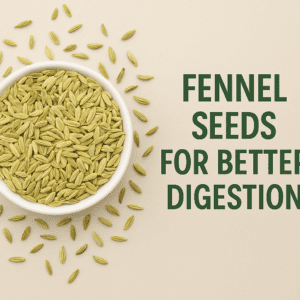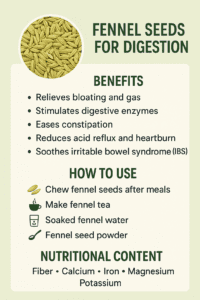If you’ve ever experienced bloating, gas, or that uncomfortable heaviness after a meal, you’re not alone. Digestive discomfort is something most of us face at some point. But did you know that a small, humble spice sitting in your kitchen could be the key to relief? Yes, we’re talking about fennel seeds—those tiny, aromatic wonders packed with powerful digestive benefits.
In this article, you’ll discover how fennel seeds can transform your digestive health naturally. We’ll explore the science behind it, practical ways to use it, and why this age-old remedy is still as relevant today as it was in ancient herbal traditions.
What Are Fennel Seeds?
Fennel seeds come from the fennel plant (Foeniculum vulgare), a flavorful herb native to the Mediterranean region. With a sweet, licorice-like flavor, these seeds have been used for centuries in both cooking and traditional medicine. In Ayurvedic and Chinese medicine, fennel seeds are praised for their ability to promote digestion, relieve bloating, and ease stomach cramps.
The Digestive System: A Quick Overview
Before diving into fennel’s benefits, it’s helpful to understand how your digestive system works. When you eat, food travels through your mouth, esophagus, stomach, and intestines. Along the way, enzymes break it down, nutrients are absorbed, and waste is eliminated. Any disruption in this process can lead to issues like gas, indigestion, or constipation.
This is where fennel seeds shine—helping your digestive system stay smooth, balanced, and comfortable.
Why Fennel Seeds Are Good for Digestion
1. Relieves Bloating and Gas
Fennel seeds are carminative—meaning they help prevent the formation of gas in the gastrointestinal tract and aid in its expulsion. If you often feel gassy or bloated after meals, chewing fennel seeds or drinking fennel tea can provide fast relief.
How it works: The essential oils in fennel seeds—such as anethole, fenchone, and estragole—have antispasmodic and anti-inflammatory properties. These compounds relax the intestinal muscles, allowing trapped gas to pass and relieving discomfort.
2. Stimulates Digestive Enzymes
Fennel seeds naturally stimulate the secretion of gastric juices and digestive enzymes, which can speed up the breakdown of food in your stomach. If you feel sluggish or full long after eating, a small dose of fennel might be just what your body needs.
3. Eases Constipation
Struggling with constipation? Fennel seeds can gently promote bowel movements. They contain dietary fiber and compounds that support intestinal motility. Drinking fennel tea or soaking the seeds in water overnight can encourage regularity without the harsh effects of commercial laxatives.
4. Reduces Acid Reflux and Heartburn
Fennel’s alkaline nature helps neutralize stomach acids. If you suffer from acid reflux or GERD, consuming fennel seeds after meals may reduce acidity and soothe the burning sensation in your chest.
5. Soothes Irritable Bowel Syndrome (IBS)
For people with IBS, fennel is a natural ally. It calms intestinal spasms and reduces bloating—two of the most common symptoms of IBS. In fact, many herbal blends for IBS include fennel as a key ingredient.
Nutritional Profile of Fennel Seeds
Fennel seeds aren’t just medicinal—they’re packed with nutrients too. Just 1 tablespoon (6 grams) provides:
-
Fiber: Helps with bowel regularity
-
Calcium: Supports muscle function and nerve transmission
-
Iron: Essential for oxygen transport in the blood
-
Magnesium: Aids in enzyme function and digestion
-
Potassium: Helps balance stomach acids
-
Vitamins A and C: Support immune function and reduce inflammation
Science-Backed Benefits of Fennel for Digestion
Many of fennel’s digestive benefits are backed by science. Here are a few notable findings:
-
A 2016 study in BioMed Research International found that fennel seed oil significantly reduced colic and abdominal pain in infants.
-
Another study published in Evidence-Based Complementary and Alternative Medicine in 2017 showed that fennel essential oil improved IBS symptoms, including bloating and gas.
-
A 2020 clinical review highlighted that fennel extracts can reduce gastrointestinal inflammation and improve gut motility in animal models.
While more research is needed, existing evidence suggests that fennel is both safe and effective for common digestive complaints.
How to Use Fennel Seeds for Digestion
Now that you know why fennel seeds are beneficial, here’s how to incorporate them into your routine:
1. Chew Fennel Seeds After Meals
This is the simplest and most traditional method. Chewing ½ to 1 teaspoon of fennel seeds after a meal helps freshen your breath and aids digestion. It’s commonly practiced in Indian households and restaurants for a reason—it works!
2. Make Fennel Tea
Recipe:
-
Boil 1 teaspoon of crushed fennel seeds in 1 cup of water for 5–10 minutes.
-
Strain and sip warm, preferably after meals.
Fennel tea is especially soothing if you have indigestion, bloating, or mild stomach cramps.
3. Soaked Fennel Water
Soaking fennel seeds overnight releases volatile oils and antioxidants.
How to prepare:
-
Soak 1 teaspoon of fennel seeds in a glass of water overnight.
-
Drink it first thing in the morning on an empty stomach.
This method is popular for those with chronic indigestion or slow metabolism.
4. Fennel Seed Powder
You can grind roasted fennel seeds into a fine powder and mix it with warm water or honey after meals. It’s especially effective when combined with cumin and coriander powders for digestive support.
Fennel Seeds in Different Cultures
Fennel has been cherished around the world:
-
India: Known as “saunf,” it’s used as a mouth freshener and digestive aid.
-
Middle East: Fennel tea is a traditional remedy for stomach cramps.
-
China: Used in Traditional Chinese Medicine to regulate the flow of Qi and relieve abdominal pain.
-
Europe: Often found in herbal liqueurs and digestive tonics.
These global traditions underline fennel’s timeless value in promoting digestive health.
Who Should Be Cautious?
While fennel seeds are generally safe, there are a few considerations:
-
Pregnant women should avoid large amounts due to mild estrogenic effects.
-
Allergies: Some people may experience allergic reactions to fennel.
-
Medication interactions: If you’re on medications for seizures or hormonal conditions, consult your doctor before using fennel medicinally.
Moderation is key. As a natural spice, fennel seeds are safe for most people when used as part of your daily diet.
Fennel Seeds vs. Other Digestive Aids
| Digestive Aid | Effectiveness | Side Effects | Natural? |
|---|---|---|---|
| Fennel Seeds | High | Minimal | Yes |
| Peppermint Oil | Moderate | Can trigger reflux | Yes |
| Antacids | Fast relief | Can cause dependency | No |
| Ginger | Moderate | May cause heartburn | Yes |
| Digestive Enzymes | Effective | Expensive | Sometimes |
Fennel seeds offer a natural, affordable, and safe solution compared to many over-the-counter products.
Tips for Choosing and Storing Fennel Seeds
-
Choose organic, whole fennel seeds for the best quality.
-
Store them in an airtight glass jar away from sunlight to preserve their oils.
-
Fresh seeds should have a strong licorice aroma—if the scent fades, they may have lost potency.
DIY Fennel Digestive Mix (Home Remedy)
You can create your own digestive mix for post-meal relief.
Ingredients:
-
2 tbsp fennel seeds
-
1 tbsp cumin seeds
-
1 tbsp coriander seeds
-
1 tsp dry ginger powder (optional)
Method:
-
Roast all seeds on low heat until aromatic.
-
Grind into a powder.
-
Take ½ tsp with warm water after meals.
This blend supports digestion, reduces bloating, and stimulates metabolism.
Testimonials and Real-Life Stories
“I used to rely on antacids after every big meal. Ever since I started chewing fennel seeds post-lunch and dinner, I haven’t needed them. My bloating is gone!” — Samantha, 35, NYC
“Drinking fennel tea after dinner has completely changed my gut health. It’s my little nighttime ritual now.” — Raj, 41, Toronto
Anecdotes like these are backed by centuries of traditional use and now by modern science.
Final Thoughts
If you’re looking for a natural way to support your digestion without harsh chemicals or expensive supplements, fennel seeds are a safe, simple, and powerful option. Whether you chew them, drink them, or soak them, incorporating fennel into your daily routine can offer lasting relief from common digestive issues.
Let this ancient remedy guide you toward a healthier, happier gut—naturally.

